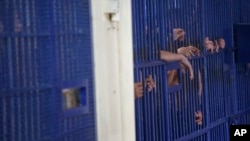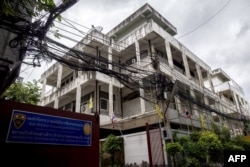Dozens of Uyghurs who fled China a decade ago and have been indefinitely detained in Thailand are getting conflicting explanations from the U.N. refugee agency and Thai authorities on why their cases are still in limbo.
"If we speak out about our condition or our situation here, it will attract media attention, the world will know, Thai authorities will find out. Then our situation here will worsen, and we might lose all communication with the outside world,” said one detainee in a rare interview with VOA.
“That's why we refrain from speaking out for the time being," added the man, asking to be identified only as Ahmad.
Ahmad said Uyghur detainees do not have phones to communicate with the outside world but said they sometimes can borrow a phone from a new detainee. That’s how Ahmad and others were able to communicate with VOA.
Rights organizations accuse Beijing of repressive policies that amount to human rights violations and even genocide against Uyghurs and other Muslim minorities, which China has repeatedly denied.
Ahmad said Uyghurs who escaped China in 2014 with the help of traffickers crossed into Thailand and were arrested by Thai authorities for illegally crossing the border. They have been held in immigration detention since then.
“We fled repression in China,” Ahmad said. He added that he and other Uyghurs in Thai detention feel they have been "abandoned" by the world over the past decade.
Over the years, there have been several news reports on the plight of the Uyghurs in Thai detention, but so far, their situation has stayed the same.
"The world has heard our appeals, but the rules of the United Nations and other [international] organizations have not yet worked in our favor," he said.
UNHCR vs. Thai authorities
Earlier this month, an investigation by The New Humanitarian news agency obtained documents that showed the Thai government in 2020 petitioned the U.N. refugee agency, or UNHCR, “to play a more active role in resolving the Uyghurs’ indefinite detention, and that agency staff advised against doing this.”
UNHCR spokesperson Babar Baloch stated that due to confidentiality constraints and a desire not to undermine efforts to resolve this sensitive matter, the UNHCR cannot publicly elaborate on its approach to addressing the situation.
“Despite requests, however, at no stage have we been permitted to access the group or engage with them for the purpose of facilitating solutions. We are engaged in close discussions with the Thai authorities,” Baloch told VOA in an email. “UNHCR has and continues to proactively raise this issue with the Thai authorities.”
Thailand has not ratified the 1951 Refugee Convention and does not have laws that give refugees legal status, but according to the UNHCR, Thailand hosts 82,400 refugees from Myanmar in temporary shelters.
Life in detention
A rights activist familiar with the situation in Bangkok, who requested anonymity due to fear of reprisals from Thai authorities, said 43 Uyghurs are being detained at the Suan Phlu Immigration Detention Center in Bangkok. Additionally, five Uyghurs who attempted to escape immigration detention and were later arrested are imprisoned in Thailand.
"At least five to six people live in a room measuring four meters wide and eight meters long," the activist said. "There are around 25 rooms on each floor of the five-story detention building, with one toilet and shower in each room," and the detainees sleep on the floor.
The activist said when the Uyghurs first crossed the border into Thailand 10 years ago, there were more than 350 of them.
"Initially, with humanitarian assistance from Turkey, over 170 women and children were taken to Turkey and settled in the city of Kayseri in 2015," the activist told VOA. "Subsequently, Thai authorities handed 109 mostly male Uyghur refugees to China weeks later," leaving more than 50 Uyghurs still awaiting their fate in Thai detention.
"After Thai authorities deported 109 Uyghurs to China, Uyghurs in Turkey protested and stormed the Thai consulate in Istanbul, which made Thai authorities very uncomfortable with the Uyghur issue," he said. “Since then, Thailand has been reluctant to deal with the rest of the Uyghur refugees.”
At the time of publication, Thai officials had not responded to numerous requests for comment from VOA.
Last year, Human Rights Watch reported that two Uyghur refugees in their 40s died while in Thai immigration detention and called on Thailand to "end the indefinite detention” of Uyghur asylum seekers from China.
According to a February letter to Thai authorities from a group of United Nations special rapporteurs, the deaths of two Uyghur refugees last year brought the total number of Uyghur deaths in Thai immigration detention centers to five, including two minors.
“We would like to bring to the attention of your Excellency’s Government information we have received concerning the detention conditions of 43 Uyghur migrant individuals that may amount to cruel, inhuman or degrading treatment or even torture,” the letter said.





